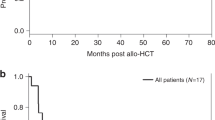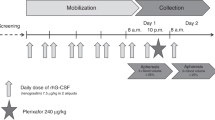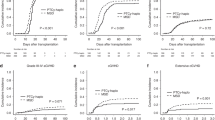Abstract
High-dose chemotherapy followed by CD34+ enriched peripheral blood progenitor cell (PBPC) transplantation is used for the treatment of primary refractory or relapsed Hodgkin’s and non-Hodgkin’s lymphomas. The CD34+ enrichment procedure, while reducing tumor burden, may compromise immunological reconstitution in the transplanted patient and result in increased rates of post-transplant infection. We compared infectious complications in patients with lymphoma who were treated with high-dose chemotherapy and supported either with CD34+ enriched PBPC (n = 19) or unmanipulated PBPCs (n = 24). Analysis was limited to patients discharged from initial hospitalization for transplantation with a minimum of 1 year follow-up and free of lymphoma recurrence. We found a statistically significant increase in the number of patients with one or more infectious events in the CD34+transplant group (14/19) compared with the unmanipulated PBPC group (9/24, P < 0.01). Greater numbers of patients with two or more infectious events were observed in the CD34+ group (7/19 vs 2/24, P < 0.03) and an increased incidence of bacterial infections was observed in the CD34+ group (10/19 vs 5/24, P < 0.05). Two deaths due to infectious complications were observed in the CD34+ group. There was no significant difference in blood lymphocyte or monocyte recovery between the groups. These data demonstrate a significant increase in the long-term incidence of infectious events in lymphoma patients transplanted with autologous CD34+ enriched PBPCs compared to unmanipulated PBPCs. Thus, patients who undergo CD34+ enriched PBPC transplantation should be followed closely for infectious complications and prolonged infectious prophylaxis should be considered. Bone Marrow Transplantation (2000) 26, 831–836.
This is a preview of subscription content, access via your institution
Access options
Subscribe to this journal
Receive 12 print issues and online access
$259.00 per year
only $21.58 per issue
Buy this article
- Purchase on Springer Link
- Instant access to full article PDF
Prices may be subject to local taxes which are calculated during checkout


Similar content being viewed by others
References
Lazarus HM, Crilley P, Ciobanu N et al. High-dose carmustine, etoposide, and cisplatin and autologous bone marrow transplantation for relapsed and refractory lymphoma J Clin Oncol 1992 10: 1682–1689
Sharp JG, Kessinger A, Mann DA et al. Outcome of high-dose therapy and autologous transplantation in non-Hodgkin’s lymphoma based on the presence of tumor in the marrow or infused hematopoetic harvest J Clin Oncol 1996 14: 214–219
Schiller G, Vescio R, Freytes C et al. Transplantation of CD34+ peripheral blood progenitor cells after high dose chemotherapy for patients with advanced multiple myeloma Blood 1995 86: 390–397
Koc ON, Gerson SL, Phillips GL et al. Autologous CD34+ cell transplantation for patients with advanced lymphoma: effects of overnight storage on peripheral blood progenitor cell enrichment and engraftment Bone Marrow Transplant 1998 21: 337–343
Nachbaur D, Fink F-M, Nussbaumer W et al. CD34+-selected autologous peripheral blood stem cell transplantation (PBSCT) in patients with poor-risk hematological malignancies and solid tumors. A single-centre experience Bone Marrow Transplant 1997 20: 827–834
Miyamoto T, Gondo H, Miyoshi Y . Early viral complications following CD34-selected autologous peripheral blood stem cell transplantation for non-Hodgkin’s lymphoma Br J Haematol 1998 100: 348–350
Nachbaur D, Kropshofer G, Feichtinger H et al. Cryptospordiosis after CD34-selected autologous peripheral blood stem cell transplantation Bone Marrow Transplant 1997 19: 1261–1263
Holmberg L, Boeckh M, Hooper H et al. Increased incidence of cytomegalovirus disease after autologous CD34-selected peripheral blood stem cell transplantation Blood 1999 94: 4029–4035
Lazarus HM, Pecora AL, Shea TC et al. CD34+ selection of hematopoietic blood cell collections and autotransplantation in lymphoma: overnight storage of product at 4°C does not affect outcome Bone Marrow Transplant 2000 25: 559–566
Bomberger C, Jairam-Singh M, Rodney G et al. Lymphoid reconstitution after autologous PBSC transplantation with FACS-sorted CD34+ hematopoietic progenitors Blood 1998 91: 2588–2600
Kiessel S, Pezzutto A, Korbling M et al. Autologous peripheral blood stem cell transplantation: analysis of autografted cells and lymphocyte recovery Transplant Proc 1989 21: 3084–3088
Talmadge JE, Reed EC, Kessinger A et al. Immunologic attributes of cytokine mobilized blood stem cells and recovery following transplantation Bone Marrow Transplant 1996 17: 101–109
Acknowledgements
This work was supported in part by Public Health Service grant P30CA43703.
Author information
Authors and Affiliations
Rights and permissions
About this article
Cite this article
Friedman, J., Lazarus, H. & Koç, O. Autologous CD34+ enriched peripheral blood progenitor cell (PBPC) transplantation is associated with higher morbidity in patients with lymphoma when compared to unmanipulated PBPC transplantation. Bone Marrow Transplant 26, 831–836 (2000). https://doi.org/10.1038/sj.bmt.1702623
Received:
Accepted:
Published:
Issue Date:
DOI: https://doi.org/10.1038/sj.bmt.1702623
Keywords
This article is cited by
-
Overnight storage of autologous stem cell apheresis products before cryopreservation does not adversely impact early or long-term engraftment following transplantation
Bone Marrow Transplantation (2006)
-
Isolation and transplantation of highly purified autologous peripheral CD34+ progenitor cells: purging efficacy, hematopoietic reconstitution in non-Hodgkin's lymphoma (NHL): results of Japanese phase II study
Bone Marrow Transplantation (2005)
-
Evaluation of potential risk factors for early infectious complications after autologous peripheral blood stem cell transplantation in patients with lymphoproliferative diseases
Annals of Hematology (2005)
-
Peripheral blood stem cell mobilization following CHOP plus rituximab therapy combined with G-CSF in patients with B-cell non-Hodgkin's lymphoma
Bone Marrow Transplantation (2004)
-
Hemopoietic Recovery and Infectious Complications in Breast Cancer and Multiple Myeloma after Autologous CD34+ Cell-Selected Peripheral Blood Progenitor Cell Transplantation
International Journal of Hematology (2004)



